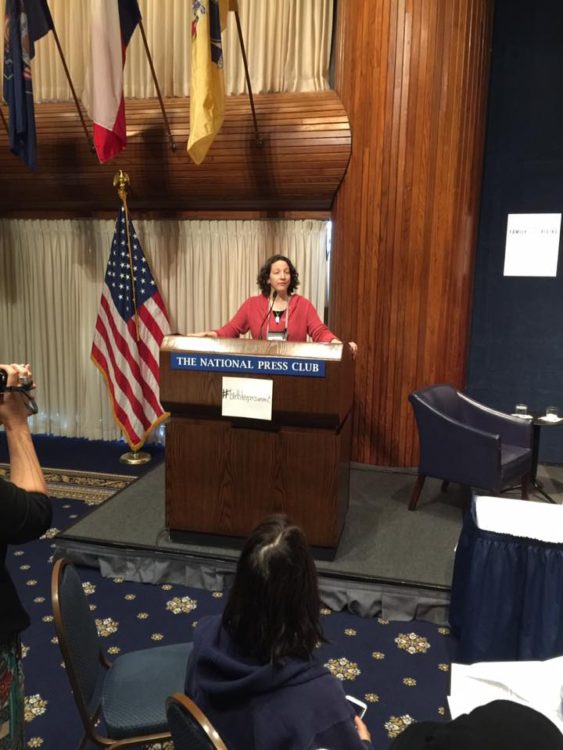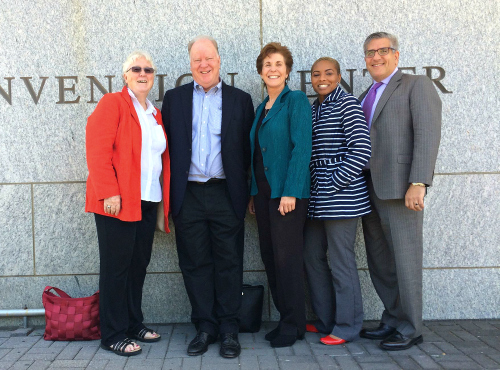BirthKeeper Coaltion Summit 2016 Highlights
A national coalition of nonprofits and a diverse group of individuals, including psychologists, medical health professionals, doctors, midwives, early developmental educators, parents and more, gathered at the Annual BirthKeeper Summit and Family Rising Rally on May 14, 2016 at the National Press Club in Washington DC. The summit’s commitment to following the annual gathering of the American College of Obstetricians and Gynecologists, ACOG, resulted in the creation of an ongoing working group collaboration this year.

The BirthKeeper Coalition represents 33 national nonprofit organizations dedicated to healthy childbirth as a human right for all women and babies. One of the many demands for this groundbreaking summit is the United States ranking – near the bottom – of all industrialized nations in maternal and infant mortality and wellness, despite spending more on maternity care than any other nation. Additionally, of 185 nations, the United States is one of three that does not provide paid maternal and family leave to support maternal and infant wellness and family bonding.
“We brought together educators, parents, organizational heads, researchers and health professionals to transform birth in America,” said BirthKeeper co-founder, Deb Puterbaugh. “This Summit represents decades of collaborative work..”
This year’s summit, “The Primal Continuum of Human Development: Critical Issues in Maternal-Child Health Care” focused on what shapes a human being from pre-conception to age one and beyond, and the crucial importance of this time on ourselves, our families, society, and our world. Scientific evidence shows that this extended period of time at the start of life – which begins before conception – sets the stage for humanity’s and the earth’s well-being.
“We want to transform beliefs and practices related to how human beings are conceived, brought into the world and cared for as they develop,” says BirthKeeper co-founder, Suzanne Arms. “What happens during this period shapes our physical, emotional, intellectual, social, sexual, and spiritual health and well-being and shapes families and societies and how we care for ourselves, each other, and our mother, earth. This is the most critical time in our lives and directly impacts whether human beings think and act from fear-defense-aggression and aloneness OR trust-compassion-cooperation-collaboration and a sense of belonging and community.”
A defining moment illustrating the need for a dialogue between healthy birth advocates and the medical institution that sets public policy for birth in the US came while BirthKeeper Coalition members rallied outside of the Annual ACOG Meeting. Several presenters argued for the artificial induction of labor for all pregnant women at 39 weeks instead of expectant management, which patiently awaits a women’s natural process to initiate labor. The backlash to the presentation appeared in the Washington Post and Modern Alternative Pregnancy who declared, “ACOG has gone too far.” (A new study out of Northwestern University and unveiled two weeks after the ACOG presenters’ pronouncement, showed that children born “late” or after 41 weeks were more likely to be considered gifted in elementary and middle school.)
In contrast to advocating for standardized interventions and medicalized birth, the message of the summit, delivered by over 30 expert speakers and panelists in the venerable National Press Club, was: “We have the information available which could prevent most of the problems of violence, addiction, and depression in our society and also create a blueprint for humanity’s peace, connection, and cooperation. The key is that a human being’s first relationship to life is crucial and the mother and her experience is the key.” Speakers and panelists at the summit included Raylene Phillips, MD, Kathleen Kendall-Tackett, PhD, Debra Pascali-Bonaro and more. You are welcome to listen to the presentations here.
As the summit speakers presented, our society’s systems of care from pregnancy to birth and the postpartum period, and the social supports for parents and children not provide optimal beginnings for human beings, the skyrocketing c-section rates, postpartum depression, infant mortality – especially in nonwhite babies, as well as systemic disrespect towards birthing mothers and their birth plans, and even VIOLENCE during birth creates they problems that we are facing like depression, drug use and violence. Physical health, as well as emotional well being begins here. (Read more about Birthing While Black in America.)
The events included the BirtKeeper Summit on May 14 at the National Press Club and a rally for Family Rising, demanding paid maternity and paternity leave on May 15, as well as a presence outside of the ACOG Annual Meeting interacting with the obstetricians in order to raise awareness about the need for reform in the way we treat mothers and babies. The summit contained a chorus of knowledgeable voices about systemic transformation, including making maternity care more mother-child centric, advocating for universal paid parental leave, and improving how we as a society relate with parenting and children.
Attendee Kelly Shaw, the Associate Director of the American Association of Birth Centers, AABC, paints a picture of the success of the Summit: “I’ve been to so many conferences; and this was unique, in a number of ways. I liked the way the day flowed, the different panel conversations, from science and biology and intuition to social forces to attachment and trauma, to visioning the future. It flowed in a very natural way, and there was so much diversity was among both the speakers and the audience. People who normally wouldn’t be brought together, whom I’ve never heard before. For example, I don’t ordinarily get to listen to a native American activist. And I was really impressed with the African-American couple who from Oklahoma who were on the visionary panel at the end of the day, not just with what they are doing in their community but with how they modeled the things they spoke about, as parents, because their young boys were right there with them. It was their way of being, not just things they said. There was a special authenticity in the way everyone spoke. The conversation about trauma, for example, was very valuable for me, deep, and not something you usually hear. I frankly didn’t realize the amount and depth of trauma many women have from what was done to them at their birth.”
Shaw continues, “The site, the National Press Club, was very special for me, with all of its history and the feeling in the room of how many important people had spoken there. I really like the concept of BirthKeeper, bringing lots of different kinds of people together to talk about a bigger picture. People and organizations tend to be in their individual silo. And the audience was seated around tables. I liked that. One thing that has stayed with me is hearing from a bold, brave older midwife from the DC area, an African American woman, who had so much wisdom. I learned a lot from her. I will absolutely attend future BirthKeeper Summits.”
Sandra Bardsley, president of the Association for Prenatal and Perinatal Psychology and Health, APPPAH, moderated a panel discussion during Saturday’s Summit and facilitated the National Press Club conference on Sunday. “APPPAH is proud to be a part of this historic event, and excitied to participate in the establishment of the new working group,” said Bardsley.
At the invitation of ACOG, representatives from BirthKeepers met with ACOG administrators to discuss the need for a more collaborative, wellness and science-based birth policy in the United States. Members of the resulting and newly created working group include:

Barbara Hotelling, past president of DONA International, Chair of the Coalition for Improving Maternity Services, CIMS, and President of Lamaze International. Currently she serves on the Certification Council of Lamaze International and the Leadership Team of CIMS ;
Raylene Phillips, MD, is currently an attending neonatologist in the NICU at Loma Linda University Children’s Hospital as well as Medical Director of Newborn Nursery at Loma Linda University Medical Center-Murrieta. Dr. Phillips is an International Board Certified Lactation Consultant and is a Fellow of the Academy of Breastfeeding Medicine. She is the current president of the National Perinatal Association.
David Paxon, MBA, is a Clinical Social Worker, Epidemiologist and Craniosacral Therapist. He is a past President of the Craniosacral Therapists Association. He has been active in APPPAH (Association for Prenatal and Perinatal Psychology and Health) for 15 years, and sponsored an APPPAH conference in Washington, DC in 2011. He is one of the core committee founders of the Birthkeepers.
Joel Evans, MD, is a board certified OB/GYN and international lecturer, is the Founder and Director of The Center for Women’s Health, where he practices Integrative Gynecology. He is also the Chief Medical Officer of LiivMD.com, and Vayas Health, start-up technology companies designed to provide the latest health information to health care consumers, physician offices and the enterprise market. Dr. Evans was honored to speak at the United Nations in March 2013 on the topic of Prenatal Origins of Violence, and he now serves as UN Representative and Chief Medical Advisor for OMAEP’s World Organization of Prenatal Education Associations and is the medical director for APPPAH. His book on the holistic approach to pregnancy, The Whole Pregnancy Handbook (Gotham, 2005), has received widespread critical acclaim and media attention.
Shatia Owsley-Humphrey is a graduate student in the department of Health Promotion (Community Health Education) at Maryland University of Integrative Health located in Laurel, Maryland. Shatia’s main fields of interest are race and ethnic relation and addressing the social inequalities in perinatal and reproductive health, particularly among women of color. Her research specifically explores how race, ethnicity, socioeconomic status, environmental conditions and stressors affect the birth outcomes in women of color, particularly African American women. She is drawn to this work due to the alarming statistics in infant and maternal mortality by race/ethnicity and socioeconomic status. Equally compelling is the opportunity to address the weakened breastfeeding statistics surrounding initiation and duration among African American women, risk factors in preterm labor and the promotion of drug-free holistic natural child birthing.
BirthKeeper Coalition affirms that it is the need and right of all childbearing women and babies to be protected, supported, and cared for during this critical time. It is also economically in the best interests of this country to make fundamental changes in how we care for every mother-baby pair.
Birthkeeper Coalition supports: sex education; fertility awareness & conscious conception; reproductive rights; “evidence-based” medical practices; preventing and healing birth-related trauma; the Midwife Model of Care; the utilization of birth centers & home birth for healthy women; birth choices & birth plans; doula support for birthing women; protecting the integrity of every mother-baby as one biological system; ending the separation of mothers and babies in hospitals; designing hospital maternity and neonatal units as sanctuaries for birth; protecting the integrity of the baby’s body; the creation of policies that promote full maternal-infant and father-baby bonding (aka attachment); making breastfeeding the norm; attachment-style parenting; Medicare coverage for all pregnant women; and universal paid maternity and paternity leave.
Resources from the summit include the Media Resource Kit, the BirthKeeper website, and a full photo gallery here. See a listing of BirthKeeper Coalition Affiliates, and contact BirthKeeper here. Family Rising, the organization that staged the march during the BirthKeeper Summit weekend, can be found here.

